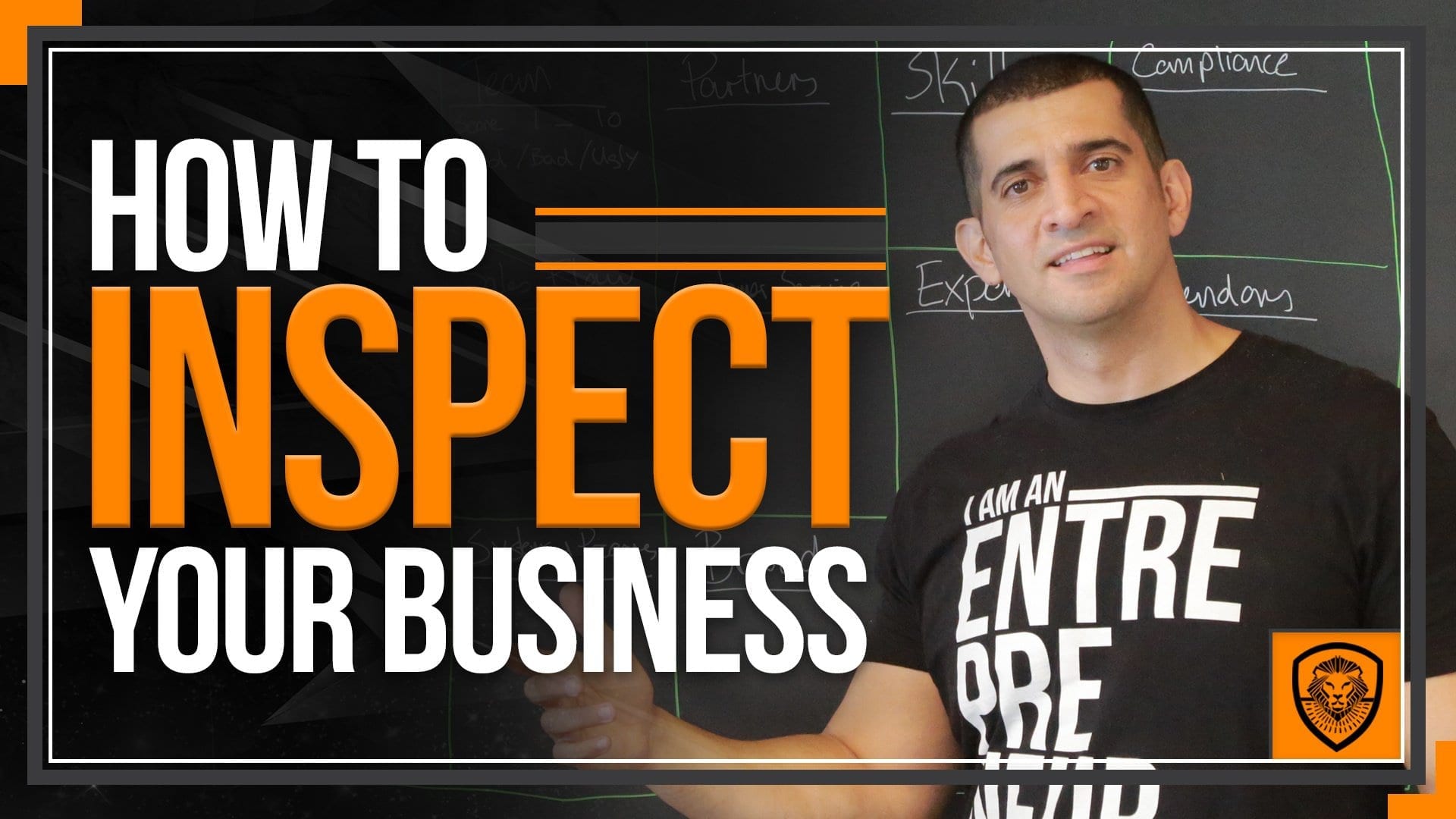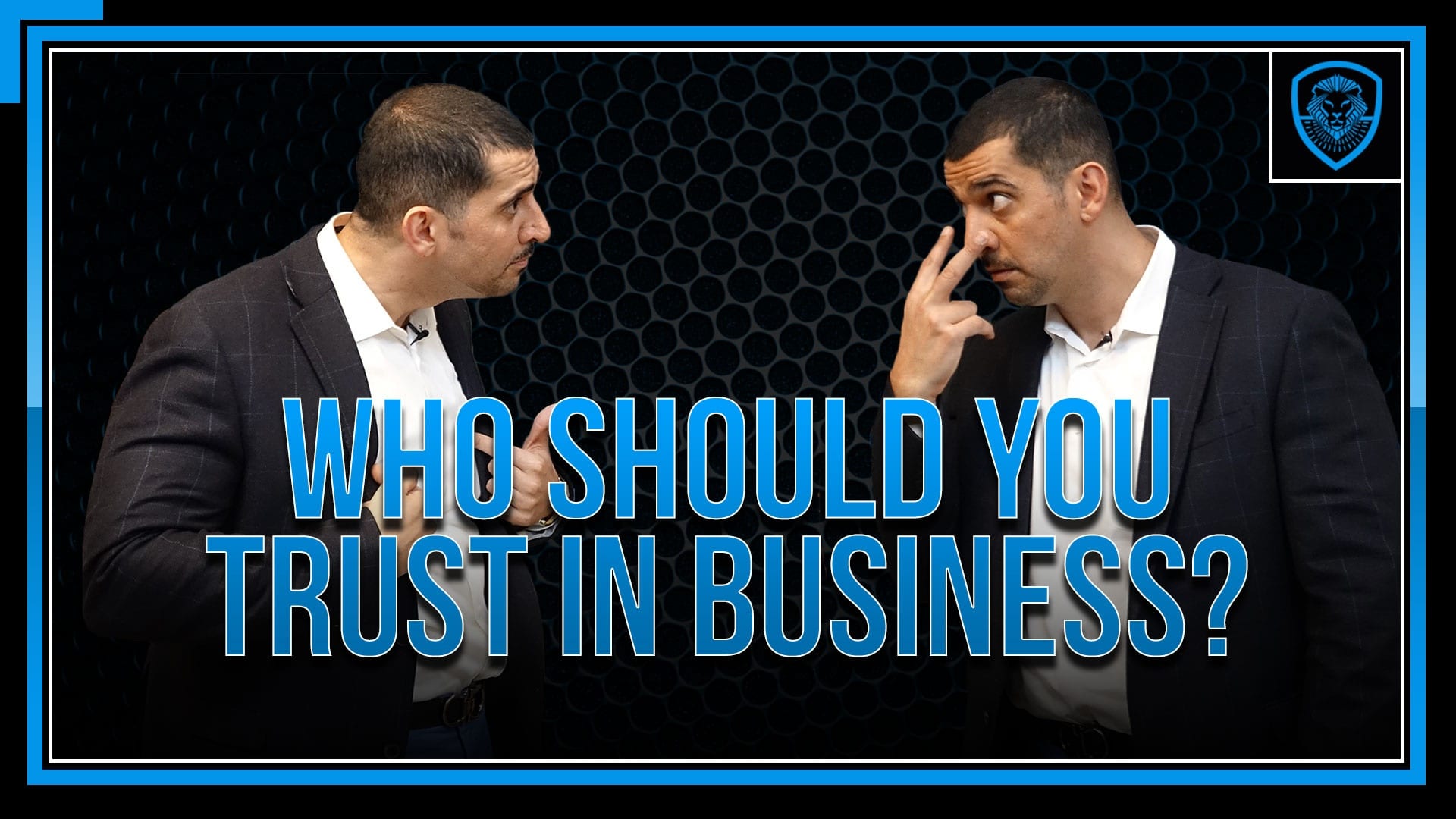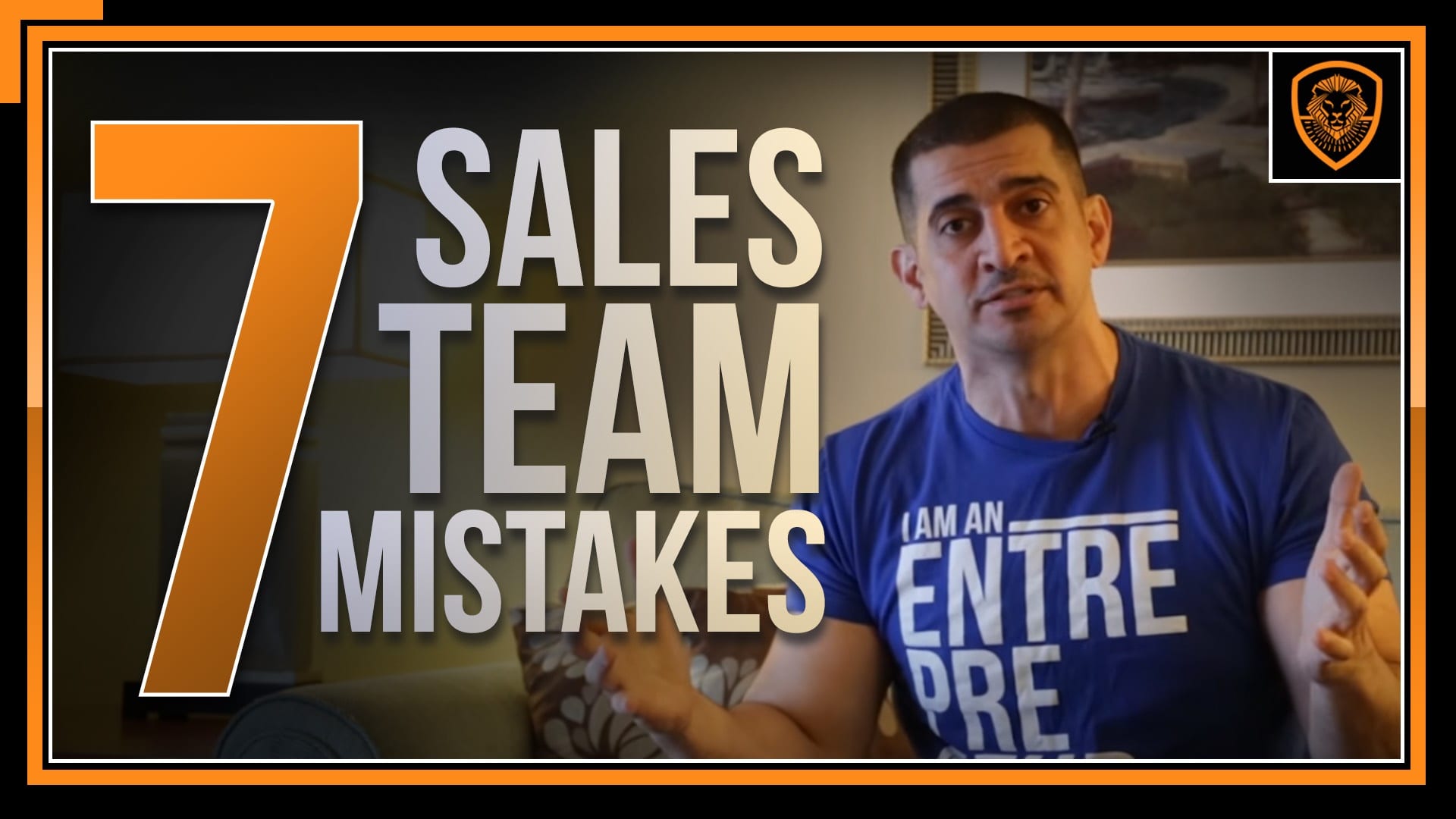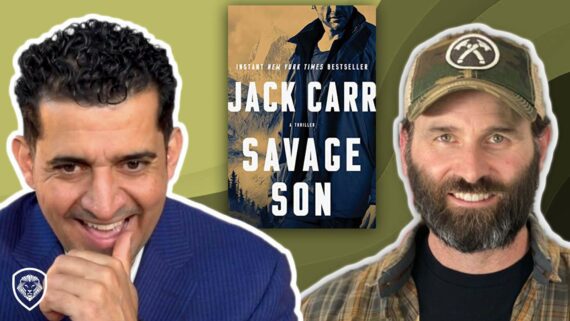Nothing improves in life unless you inspect it regularly. And I mean nothing. So today I’m going to talk about how to inspect your business in 12 crucial areas. If you properly do the exercise I share in this video, you’ll make millions.
How to Inspect Your Business
First of all, there are 12 different categories that I have listed below. And every one of them is tied to a number and a goal. Every single one of them. I'll go through each of them and explain how to inspect each of the 12 different categories of your business.
#1: Team
The first one is team. Your team could be your assistant, your executives, your sales force. It can be many different things.
When I look at my team, I look at the team within different departments and ask:
- Who do I need?
- Who am I missing?
- What department needs help?
- What department needs a leader?
- What department needs support?
- What department doesn't need people? Is there a department where I need to fire the weakest link that slows everybody else down?
When I look at my team, I score the team, between one to 10. As an example, let's say the score is a five. I'd write down the good, that two specific people have grown a lot from last year to this year. The bad is that we still don't have somebody who knows how to do a specific thing we need. The ugly is that one department is a disaster this year.
Then I write down three actionable items, and tie the action item to a number and a goal. For instance, I'll hire three people, two in this department, one in that department, and fire this one person.
The second action item is that I set an expectation that the team is going to do $600,00 in the next two weeks.
So for this category, and for each of the categories below, there will be a number and a goal tied to them when it comes to actionable items.
#2: Sales Flow
The second one is sales flow. How's my sales flow looking? So I'll go through and look at the sales cycle:
- Where does the customer come in?
- Once the customer comes in, what options do they have?
- Is it pretty easy for them to know what next steps to take?
- Do they find this pretty well?
- Do we do a good job of selling and do we do a good job of presenting?
- Do we do a good job of going through the sales flow part?
- Do the people know the products that they're selling to them?
- It is pretty easy?
- Do we sell it in a simple way?
For more information on the sales process, check out the video below:
You'll score yourself in this category in the same way as the others.
#3: Systems and Procedures
The next one is systems and procedures. For example, ask yourself:
- What is the system that we have in the company for hiring? Meaning, when you sit down and you hire somebody, what questions do you ask when hiring?
- How is the firing protocol? How do we fire somebody? Who fires somebody?
- What do we do with the exit interview?
- What opportunities do we give to them?
- How do we let them go?
- What is the system when we have a complaint come in?
- What is the system that we have when a question comes in?
- What is the system that we have when we have a good story come in?
- What is the system and procedure that we have when we recruit somebody when we're putting them in a department that's processing or compliance or operations or . . .
- What is our system for training new hires?
- How is the new hire going to learn about our company?
- How is the new hire going to be injected into the culture?
- What process do they go through for orientation?
- Is our CRM doing a good job, or can we get a better one?
- What aspects of the software are we using/not using?
- Should we eliminate anything?
- What can we enhance?
These are the types of questions I ask about systems and processes.
You'll score yourself in this category in the same way as the others.
#4: Partners
The next category is partners. How are our partners doing?
Now keep in mind that on this list of categories to inspect in your business, there are partners and vendors. Partners and vendors are different. A partner is somebody that I have worked with generally for three years or more. Once somebody I've worked with for three years or more who is invested in wanting to improve the relationship, they're investing money and they're vested in wanting to improve the relationship, they become a partner to me.
When I inspect this category I ask:
- How's the partner doing with us?
- Are they servicing properly?
- Is it getting better?
- What can we do to make this partnership better?
So in the partnership category, I will make a list of all of our partners, and score each of them separately. I'll look at the good, bad and ugly of each partnership, and the three actionable items I need to have for each partnership. I'll make note of the things I need to talk to them about when I have a conversation with them.
I ask questions such as:
- With this partnership, have the numbers gone up or down?
- Why has it gone down?
- Is it our fault?
- Is it their fault?
- Why is it that their processes haven't improved?
- What are some things they're maybe not happy with us and we can improve?
- Have we delivered on our promises?
- What do I need to negotiate with the partners?
- What conversations do I need to have with the partners?
I write down which partners I need to speak with again.
#5: Customer Service
Here are some questions to ask when evaluating how you're doing with customer service:
- How is our customer service?
- Is our customer service good or are we way too aggressive?
- Are we listening to the customers?
- Do we become too offensive too early?
- Is our way of selling a way that makes customers happy?
- What is the experience we're giving to our customers?
- What words do we use? Do we use a script or is it more of an experience?
- Are we doing a good job teaching customer experience and customer service?
- Are we doing a good job taking care of our clients in a way that we're getting more referrals?
Break it down, and then find out about the five least happy clients that we had this year. Why were they not happy? Out of the five let's just say that one of them was just a rant. They were just unhappy, nothing made them happy, and you can see the trend because everybody is unhappy with that one client. Great. But the other two had valid points. And these other two had questions that we never answered. Why don't we call these two? Let's find out a little bit more. Let's let them teach us about our customer service. Tell us what you're not happy about. What happened? We want to learn. We want to improve. Give them a way to share feedback with you so you can improve.
This is probably one of the most important ones and one of the most difficult ones because it's an area you don't have control in, but it's an area that when you're running and gunning, you forget to do this sometimes. You need to do it. The sooner you can do it, the better it is.
You'll score yourself in this category in the same way as the others.
#6: Brand
Now it's time to inspect how your brand is doing with questions like this:
- What does the brand mean?
- What does the market see our brand as?
- Is it improving?
- Is it getting into every single household?
- What is the meaning of our brand?
- What's the story behind our brand?
We sit down with people and ask things like:
- "What do you think about when you think about the company?"
- If I were to ask you, "What do you think about Valuetainment?"
- Can you tell me what our mission statement means to you?"
I want to see the heart. I don't want to see the logical side. I want to hear them. Because based on their answer I may realize that we're too logical, or that we've gotten away from the initial mission statement of the company, and forgotten what it's all about. If we've forgotten what it was all about, then it was my fault. I've got to take responsibility for it because I'm the leader.
Look at every aspect of the brand - website, social media, everything, and then with do the same thing - score 1-10, good, bad, ugly, and three actionable items to improve in.
#7: Skills
Listen in here for how to inspect the skills of each of your team members -- including you.
#8: Expansion
Expansion is what market do you want to get into that you're not into right now? When we first started our insurance agency, we were all in Northridge, California. We had one office, 66 agents. We wanted to expand and grow from one state to two states, so we went to Florida. I sent one of our executives over to Florida.
From there we asked, "How are we going to go into different markets?" Then we put our plan of action together, our strategy together, on which markets we wanted to get into. Then all of a sudden, we went from two states to five to ten, to 20, to 30, to 40 - I think we're in 44 or 45 states right now. By the end of the year, we'll be in all states. That's because we talk about expansion.
A lot of times I see entrepreneurs that do one of too things:
- Think about expansion too early and lose the penetration that they have locally
- Or they never think about it, and they just hope it happens accidentally.
Both ways are flawed. Here's what I mean by that. If you have three people or five people or a small sales force, you don't want to all of a sudden spread everybody thin and have people go different places.
It's like military. You don't want to go to war and tell your generals you've got 200 soldiers, and you put them 20 different places in groups of 10. If you do that, all of a sudden, 70 got killed because they're too weak, because they faced 600 soldiers in one area. So instead, you could wait until you have 350, and then move 50.
Here are a few questions to ask when you inspect your business in the area of expansion:
- Is it the right time for me to expand?
- Is this person ready to go to a new market?
- Are we ready to take this product into a new market?
- Do we want to go into this state?
- What are the top metropolitan cities?
- Is our product tailored to a metropolitan city or is our product tailored to a second tier city?
So you've got to sit there and really think about expansion. Then again, do the same exact thing: 1-10, good, bad, ugly, with three actionable items.
#9: Culture
Culture is something that it goes back to the brand. Brand and culture are very similar, but with culture, if you no longer go and circulate among the troops, the further you get away from it, it disappears. It is very important for you to circulate among your troops for the culture to stay intact.
So ask yourself:
- What was the culture in the first year?
- What was the culture in the second year?
- What is the culture in the third year?
And we continue. The basic thing I'll tell you is the difference between a cult and a culture. A cult is all predicated on a cult leader. A culture is no longer predicated on a cult leader.
So maybe you went from being a cult, because everything was dependent on you and you're no longer a cult; now you are a culture.
The question is, if the cult leader dies, will the culture continue? Hopefully there's been duplication taking place with other people taking the culture to the next level where this is no longer needed and it becomes a figure head or a voice. The more you're touching the culture, the thicker it gets and the more social capital it creates. Then there's a part where you ask if you're evolving, adapting, or still the same.
Sometimes a problem with bigger companies is that their culture is outdated. They may be old school. Well maybe old school doesn't work because the person you're trying to attract is not turned on by old school.In that case questions you have to ask yourself:
- Who do we want as a customer?
- Are they going to be interested in our culture that hasn't adapted yet?
Culture requires a lot of due diligence. In this video I get into very vivid details about how to work on company culture:
#10: Compliance
Compliance is boring. No one likes compliance. But compliance is what keeps you in business. Every business has compliance, and you've got to get the best compliance people working with you.
When I was smaller I ran a sales shop out of Granada Hills. Our office wasn't in the best area. A couple of times there was a drive by. We had a legalized marijuana joint and they were not only selling marijuana, they were selling cocaine and other things out of this place. So anybody that came into office our smelled the marijuana. Maybe that's why people bought easily from us. Maybe that kind of helped out a little bit. But compliance was something I invested in, because it kept me in business.
Even if you're a marketer and in sales, and going a million miles an hour, you have to hit compliance. If you don't, all of a sudden you'll have an avalanche of compliance problems that you'll have to solve two years from now. You could have solved them sooner if you touched up compliance. So don't skip this too quickly. It is very, very critical to know exactly what compliance issues you have.
Keep in mind that sometimes compliance requires you to hire new team members.
You'll score yourself in this category in the same way as the others.
#11: Vendors
Vendors are people I'm doing business with, that I'm transacting with. I consider which of these vendors can possibly become partners, and which ones I want to fire. There's a vendor this year I'm firing. I'm not happy with this vendor. That person's going to get a personal phone call saying, "you're fired."
I love vendors who have aspirations of becoming partners. I have a very big problem with vendors who have already done business with you two or three times and they've gotten 100, 200, 300 thousand dollars out of you, or let's just say a million dollars out of you because you've done business with them. They may think it's now on autopilot and they can now upsell you by 10% or 15% or add in hidden commissions because you're already doing business with them. I have a very big problem with that, and every time it happens, someone gets fired.
So when you inspect your business with vendors, look at which ones you need to have a private conversation with. Tell them exactly what your expectation of them is moving forward.
And then sometimes the vendors are doing such a great job, and I'm really hoping that we can move them over to being partners.
You'll score yourself in this category in the same way as the others.
#12: Competition
Listen in here for how to inspect your competition.
When You Inspect Your Business, It Can be Worth Millions
By the way, when you do this once a year it takes a full day. It's well worth it. It will make you millions if you do it properly.
Six months later do it again, as an overview. Debrief what you did for the full day. Recap and go through the points and mark off where you need to adjust. Highlight actionable items you've already hit and which ones are close. Email people and remind them about what you talked about, and update everyone on the current status.
You'll want to go through this video more than once, and be sure to download the worksheet to go with it by filling out the form below.







